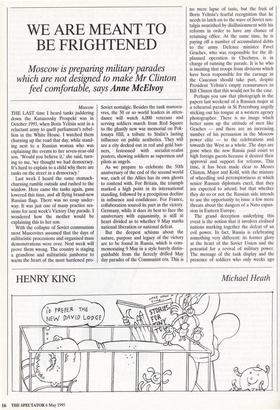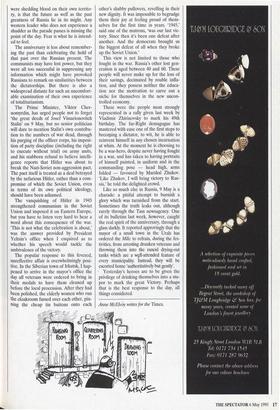WE ARE MEANT TO BE FRIGHTENED
Moscow is preparing military parades which are not designed to make Mr Clinton
feel comfortable, says Anne McElvoy Moscow THE LAST time I heard tanks juddering down the Kutuzovsky Prospekt was in October 1993, when Boris Yeltsin sent in a reluctant army to quell parliament's rebel- lion in the White House. I watched them churning up the road that day, while stand- ing next to a Russian woman who was explaining the events to her seven-year-old son. 'Would you believe it,' she said, turn- ing to me, 'we thought we had democracy. It's hard to explain to a child why there are tanks on the street in a democracy.'
Last week I heard the same stomach- churning rumble outside and rushed to the window. Here came the tanks again, guns lowered this time, and all flying brand-new Russian flags. There was no coup under- way. It was just one of many practice ses- sions for next week's Victory Day parade. I wondered how the mother would be explaining this to her son.
With the collapse of Soviet communism most Muscovites assumed that the days of militaristic processions and organised mass demonstrations were over. Next week will prove them wrong. The country is staging a grandiose and militaristic jamboree to warm the heart of the most hardened pro- Soviet nostalgic. Besides the tank manoeu- vres, the 50 or so world leaders in atten- dance will watch 6,000 veterans and serving soldiers march from Red Square to the ghastly new war memorial on Pok- lonaya Hill, a tribute to Stalin's lasting influence on public aesthetics. They will see a city decked out in red and gold ban- ners, festooned with socialist-realist posters, showing soldiers as supermen and pilots as angels.
As we prepare to celebrate the 50th anniversary of the end of the second world war, each of the Allies has its own ghosts to contend with. For Britain, the triumph marked a high point in its international standing, followed by a precipitous decline in influence and confidence. For France, collaboration soured its part in the victory. Germany, while it does its best to face the anniversary with equanimity, is still at heart divided as to whether 9 May marks national liberation or national defeat.
But the deepest schisms about the nature, purpose and legacy of the victory are to be found in Russia, which is com- memorating 9 May in a style barely distin- guishable from the fiercely drilled May day parades of the Communist era. This is no mere lapse of taste, but the fruit of Boris Yeltsin's fearful recognition that he needs to latch on to the wave of Soviet nos- talgia nourished by disillusionment with his reforms in order to have any chance of retaining office. At the same time, he is paying off a number of accumulated debts to the army. Defence minister Pavel Grachev, who was responsible for the ill- planned operation in Chechnya, is in charge of running the parade. It is he who is insisting that troops from divisions which have been responsible for the carnage in the Caucasus should take part, despite President Yeltsin's empty reassurances to Bill Clinton that this would not be the case.
Perhaps you saw that photograph in the papers last weekend of a Russian major at a rehearsal parade in St Petersburg angrily sticking out his tongue at a western agency photographer. There is no image which better sums up the attitude of men like Grachev — and there are an increasing number of his persuasion in the Moscow power elite — to the celebrations and towards the West as a whole. The days are gone when the new Russia paid court to high foreign guests because it desired their approval and support for reforms. This time, it has been made clear to Messrs Clinton, Major and Kohl, with the mixture of wheedling and peremptoriness at which senior Russian diplomats excel, that they are expected to attend, but that whether they do so or not the Russian side intends to use the opportunity to, issue a few more threats about the dangers of a Nato expan- sion in Eastern Europe.
The grand deception underlying this event is the notion that it involves civilised nations marking together the defeat of an evil power. In fact, Russia is celebrating something very different: its former glory at the heart of the Soviet Union and the potential for a revival of military power. The message of the tank display and the presence of soldiers who only weeks ago were shedding blood on their own territo- ry, is that the future as well as the past greatness of Russia lie in its might. Any western leader who does not experience a shudder as the parade passes is missing the point of the day. Fear is what he is intend- ed to feel.
The anniversary is less about remember- ing the past than celebrating the hold of that past over the Russian present. The communists may have lost power, but they were all too successful in suppressing any information which might have provoked Russians to remark on similarities between the dictatorships. But there is also a widespread distaste for such an uncomfort- able examination of their own experience of totalitarianism.
The Prime Minister, Viktor Cher- nomyrdin, has urged people not to forget `the great deeds of Josef Vissarionovitch Stalin' on 9 May, but no senior politician will dare to mention Stalin's own contribu- tion to the numbers of war dead, through his purging of the officer corps, his imposi- tion of party discipline (including the right to execute without trial) on army units, and his stubborn refusal to believe intelli- gence reports that Hitler was about to break the Nazi-Soviet non-aggression pact. The pact itself is treated as a deal betrayed by the nefarious Hitler, rather than a com- promise of which the Soviet Union, even in terms of its own political ideology, should have been ashamed.
The vanquishing of Hitler in 1945 strengthened communism in the Soviet Union and imposed it on Eastern Europe, but you have to listen very hard to hear a word about this consequence of the war. `This is not what the celebration is about,' was the answer provided by President Yeltsin's office when I enquired as to whether his speech would tackle the ambivalence of the victory.
The popular response to this fevered, unreflective affair is overwhelmingly posi- tive. In the Siberian town of Irkutsk, I hap- pened to arrive in the mayor's office the day all veterans were ordered to bring in their medals to have them cleaned up before the local procession. After they had been polished, the elderly women who run the cloakroom fussed over each other, pin- ning the cheap tin buttons onto each other's shabby pullovers, revelling in their new dignity. It was impossible to begrudge them their joy at feeling proud of them- selves for the first time in years. '1945; said one of the matrons, 'was our last vic- tory. Since then it's been one defeat after another. And the democrats brought us the biggest defeat of all when they broke up the Soviet Union.'
This view is not limited to those who fought in the war. Russia's other lost gen- eration is aged between 40 and 60. These people will never make up for the loss of their savings, decimated by rouble infla- tion, and they possess neither the educa- tion nor the motivation to carve out a niche for themselves in the new uncon- trolled economy.
These were the people most strongly represented in a rally given last week by Vladimir Zhirinovsky to mark his 49th birthday. The far-Right demagogue has mastered with ease one of the first steps to becoming a dictator, to wit, he is able to reinvent himself in any chosen incarnation at whim. At the moment he is choosing to be a war-hero, despite never having fought in a war, and has taken to having portraits of himself painted, in uniform and in the commanding pose — head high, arms folded — favoured by Marshal Zhukov. `Like Zhukov, I will bring victory to Rus- sia,' he told the delighted crowd.
Like so much else in Russia, 9 May is a charade: a pitiful attempt to burnish a glory which was tarnished from the start. Sometimes the truth leaks out, although rarely through the Tass newsagency. One of its bulletins last week, however, caught the real spirit of the anniversary, through a glass darkly. It reported approvingly that the mayor of a small town in the Urals has ordered the Miliz to refrain, during the fes- tivities, from arresting drunken veterans and throwing them into the rancid drying-out tanks which are a w;ll-attended feature of every municipality. Instead, they will be escorted home 'authoritatively but gently'.
• Yesterday's heroes are to be given the privilege of drinking themselves into a stu- por to mark the great Victory. Perhaps that is the best response to the day, all things considered.
Anne McElvay writes for the Times.



































































 Previous page
Previous page